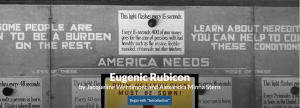Digital Data Projects
Digital Data
Julian Chambliss
Erasure and Data
The challenge of the constructed nature of data knowledge is expressed through multiple historical practices. The projects listed below leverage engagement with data through a variety of ideological and methodological approaches to broaden our understanding of humane questions. This list is not exhaustive; instead, we seek to call attention to how scholars have employed digital tools to broaden our understanding.

Advocate Recovered (AR) is a digital recovery project designed by Dr. Julian C. Chambliss from the Department of English at Michigan State University. This project grew from a digital simulation examining the voting and civil rights history of the African-American community in Central Florida. This project aims to recover the contents of The Winter Park Advocate, an African-American newspaper published in Winter Park, Florida. Published by African-American supporters of the Republican Party in the 1890s, this newspaper offers the opportunity to document the evolution of black sociopolitical culture in the deep South.

The Anti-Eviction Mapping Project is a data visualization, data analysis, and storytelling collective documenting the dispossession and resistance to gentrifying landscapes. Primarily working in the San Francisco Bay Area, Los Angeles, and New York City, we are all volunteers producing digital maps, oral history work, film, murals, and community events. Working with several community partners and in solidarity with numerous housing movements, we study and visualize new entanglements of global capital, real estate, technocapitalism, and political economy. The narrative oral history and video work center on the displacement of people and complex social worlds, but also modes of resistance. Maintaining antiracist and feminist analyses as well as decolonial methodology, the project creates tools and disseminates data contributing to collective resistance and movement building.

COVID Black works at the intersection of health data, information, the humanities, race, and social justice. We redefine statistics and information into living data and stories about Black Health. We are data griots. We are Black data storytellers. And we are redefining the future of Black health by marrying ancestry with data analytics & technology. Covid Black is a data organization team consisting of scholars such as Kim Gallon, Peace Ossom Williamson, Romae Morgan, and many others. A full roster of the team is available online.

Eugenic Rubicon is a developing prototype that uses mixed media and digital storytelling methods to share a history of eugenics. More than 60,000 people in the United States were sterilized in state asylums and hospitals under eugenic laws. While some histories have been written, little is known about the demographics and experiences of the countless people sterilized against their will. While eugenics laws have been struck down and removed, the legacies of these practices have shaped communities and relationships between communities throughout the U.S. This is a digital project led by Jacqueline Wernimont (Arizona State University) and Alexandra Minnia Stern (University of Michigan).
![]()
Mapping Police Violence utilizes public data to document deaths linked to policing. The data demonstrates that Blacks are approximately three times more likely to be killed in comparison to their White counterparts. Moreover, 97% of the killings in the project database occurred while a police officer was acting in a law enforcement capacity.

